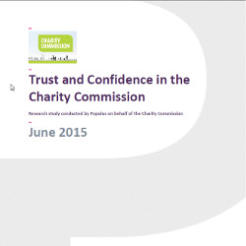More than two thirds of charities oppose charging the sector for regulation, but three quarters of the public support it, according to a report published today by the Charity Commission.
The regulator commissioned research to determine public and charities’ views of its work, and the results are published today in Trust and Confidence in the Charity Commission.
The Commission’s report was based on research by polling firm Populus, which contacted more than 1,000 members of the public using “computer-aided telephone interviews”, and also more than 1,100 senior individuals in charities through online interviews. It also conducted 22 in-depth telephone interviews with charities, government officials, umbrella bodies and professional advisors. Research took place in April and May. Interviews took place before the recent debate about the regulation of fundraising.
“There is a clear difference of opinion between charities and the general public regarding how charity regulation should be funded,” the report said. “Whilst two-thirds (68%) of charities believe charity regulation should be funded entirely through general taxation, just a quarter (25%) of the general public agree.
“In contrast, two-thirds (69%) of the general public support charity regulation being partly or fully funded by a charge to charities, compared to under a quarter (23%) of charities.
“The key stakeholders are also divided in their views. Some support continued full Government funding, and others are open to the idea of a mixed funding model.”
Reaction from the sector
Charity leaders expressed caution about the idea of charging charities for their regulation.
Sir Stuart Etherington, chief executive of NCVO, said: “It’s in the long-term interests of charities that the Commission has the funds it needs to be responsive and effective. I’m happy to canvass NCVO members’ views on this.
“But any move to charging would need to go hand in hand with reforms to ensure the Charity Commission is independent of government and is seen to be independent of government. It couldn’t just be a matter of charities subsidising the Commission under the current setup.”
Sir Stephen Bubb, chief executive of Acevo, said: “This report shows that the Charity Commission is doing some things well, but is still behind the curve on issues of importance.
“The Commission has pushed for charities to be charged for the Commission’s work but there is clearly no mandate for this. There would be ongoing questions around governance and probity of such an arrangement. The regulator must take heed of this consensus rather than pursue the agenda regardless.
“It is striking that less than half the public think that the regulator is consistent in its affairs. Less than 60 per cent of charities think it consistently delivers. There was a consensus also in the comments to the consultation on ongoing concerns about the Charity Commission’s attitudes to campaigning and the decisions taken to focus on some cases rather than others, often driven by media priorities. We have seen welcome engagement from the Commission with the sector on these matters but they clearly have some way to go.”
Trust and confidence
The research also found that there was relatively high trust and confidence in the Commission, with charities on average scoring it 8.3 out of 10, and the public 6 out of 10.
And it found that 92 per cent of charities and 76 per cent of the public support new powers for the Commission, as outlined in the Charities (Protection and Social Investment) Bill which is currently making its way through Parliament.
It found that 74 per cent of the public and 59 per cent of charities believe the Commission should be more proactive in speaking out on charity issues.
Engagement with charities
After several years in which rising public engagement with charities was reported, this year the figure fell by half. Just 19 per cent of individuals said they or their close family and friends have benefited from a charity’s services, compared to 40 per cent the previous year.
Four per cent of the public said they had had a problem with a charity in the last 12 months.









